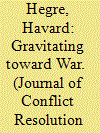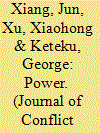| Srl | Item |
| 1 |
ID:
082936


|
|
|
|
|
| Publication |
2008.
|
| Summary/Abstract |
Countries have better abilities and stronger incentives to engage in militarized conflicts the larger and more powerful they are. The article applies Zipf's notion of a ``gravity model'' to the risk of interstate conflict and argues that the empirical relationship between size and distance and conflict is stronger than any other identified in dyadic statistical studies of interstate conflict. Most empirical studies of interstate conflict fail to take size properly into account. The article shows that controlling for size variables improves the estimation of other variables of interest, and it explores the impact of omitting size variables for the investigation of the power preponderance versus power parity debate. The results indicate that even though a power capability ratio variable suggests asymmetric dyads are less conflict-prone, the risk-increasing effect of power itself means that a unilateral increase of power in one country increases the risk of conflict
|
|
|
|
|
|
|
|
|
|
|
|
|
|
|
|
| 2 |
ID:
078689


|
|
|
|
|
| Publication |
2007.
|
| Summary/Abstract |
We join the debate on trade interdependence and conflict with a reexamination of Barbieri's (1996) intriguing empirical results showing that under certain circumstances, trade interdependence causes conflict. We argue that these findings resulted from a specification that was missing a variable. We return to Barbieri's models and introduce two independent power measures for countries within each dyad. When a correctly specified trade-conflict regression model incorporating the new power variables is performed, the constraining effect of interdependence becomes evident, and the results obtained are the reverse of Barbieri's.
|
|
|
|
|
|
|
|
|
|
|
|
|
|
|
|
| 3 |
ID:
101694


|
|
|
|
|
| Publication |
2010.
|
| Summary/Abstract |
Two studies question whether economic interdependence promotes peace, arguing that previous research has not adequately considered the endogeneity of trade. Using simultaneous equations to capture the reciprocal effects, they report that trade does not reduce conflict, though conflict reduces trade. These results are puzzling on logical grounds. Trade should make conflict less likely, ceteris paribus, if interstate violence adversely affects commerce; otherwise, national leaders are acting irrationally. In re-analyzing the authors' data, this article shows that trade does promote peace once the gravity model is incorporated into the analysis of conflict. Both trade and conflict are influenced by nations' sizes and the distance separating them, so these fundamental exogenous factors must be included in models of conflict as well as trade. One study errs in omitting distance when explaining militarized disputes. The other does not adequately control for the effect of size (or power). When these theoretically informed changes are made, the pacific benefit of trade again appears. In new simultaneous analyses, the article confirms that trade promotes peace and conflict contemporaneously reduces commerce, even with extensive controls for traders' rational expectations of violence. Previous studies that address the endogeneity of trade by controlling for the years of peace - as virtually all have done since 1999 - have not overstated the benefit of interdependence. Commerce promotes peace because violence has substantial costs, whether these are paid prospectively or contemporaneously.
|
|
|
|
|
|
|
|
|
|
|
|
|
|
|
|